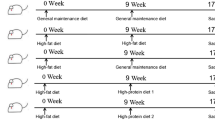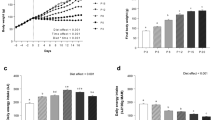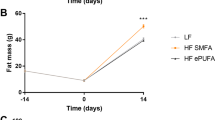Abstract
BACKGROUND:
High protein (HP) diets during energy restriction have been studied extensively regarding their ability to reduce body fat and preserve lean body mass, but little is known about their effects on protein metabolism in lean tissues.
OBJECTIVE:
To determine the effects of energy restriction and protein intake on protein anabolism and catabolism in rats.
METHODS:
For 5 weeks, 56 male Wistar rats were fed an obesity induction (OI) diet . They were then subjected to a 40% energy restriction using the OI diet or a balanced HP diet for 3 weeks, whereas a control group was fed the OI diet ad libitum (n=8 per group). HP-restricted rats were divided into five groups differing only in terms of their protein source: total milk proteins, casein (C), whey (W), a mix of 50% C and W, and soy (n=8). The animals were then killed in the postprandial state and their body composition was determined. Protein synthesis rates were determined in the liver, gastrocnemius and kidney using a subcutaneous 13C valine flooding dose. mRNA levels were measured for key enzymes involved in the three proteolysis pathways.
RESULTS:
Energy restriction, but not diet composition, impacted weight loss and adiposity, whereas lean tissue mass (except in the kidney) was not influenced by diet composition. Levels of neoglucogenic amino acids tended to fall under energy restriction (P<0.06) but this was reversed by a high level of protein. The postprandial protein synthesis rates in different organs were similar in all groups. By contrast, mRNA levels encoding proteolytic enzymes rose under energy restriction in the muscle and kidney, but this was counteracted by a HP level.
CONCLUSIONS:
In adult obese rats, energy restriction but not diet composition affected fat pads and had little impact on protein metabolism, despite marked effects on proteolysis in the kidney and muscle.
This is a preview of subscription content, access via your institution
Access options
Subscribe to this journal
Receive 12 print issues and online access
$259.00 per year
only $21.58 per issue
Buy this article
- Purchase on Springer Link
- Instant access to full article PDF
Prices may be subject to local taxes which are calculated during checkout



Similar content being viewed by others
References
Serdula MK, Mokdad AH, Williamson DF, Galuska DA, Mendlein JM, Heath GW . Prevalence of attempting weight loss and strategies for controlling weight. JAMA 1999; 282: 1353–1358.
Freedman MR, King J, Kennedy E . Popular diets: a scientific review. Obes Res 2001; 9 (Suppl 1): 1S–40S.
Dansinger ML, Gleason JA, Griffith JL, Selker HP, Schaefer EJ . Comparison of the Atkins, Ornish, Weight Watchers, and Zone diets for weight loss and heart disease risk reduction: a randomized trial. JAMA 2005; 293: 43–53.
Blanck HM, Gillespie C, Serdula MK, Khan LK, Galusk DA, Ainsworth BE . Use of low-carbohydrate, high-protein diets among americans: correlates, duration, and weight loss. MedGenMed 2006; 8: 5.
Bensaid A, Tome D, L’Heureux-Bourdon D, Even P, Gietzen D, Morens C et al. A high-protein diet enhances satiety without conditioned taste aversion in the rat. Physiol Behav 2003; 78: 311–320.
Johnston CS, Tjonn SL, Swan PD . High-protein, low-fat diets are effective for weight loss and favorably alter biomarkers in healthy adults. J Nutr 2004; 134: 586–591.
Layman DK, Boileau RA, Erickson DJ, Painter JE, Shiue H, Sather C et al. A reduced ratio of dietary carbohydrate to protein improves body composition and blood lipid profiles during weight loss in adult women. J Nutr 2003; 133: 411–417.
Hoffer LJ, Bistrian BR, Young VR, Blackburn GL, Matthews DE . Metabolic effects of very low calorie weight reduction diets. J Clin Invest 1984; 73: 750–758.
Krieger JW, Sitren HS, Daniels MJ, Langkamp-Henken B . Effects of variation in protein and carbohydrate intake on body mass and composition during energy restriction: a meta-regression 1. Am J Clin Nutr 2006; 83: 260–274.
Aoyama T, Fukui K, Nakamori T, Hashimoto Y, Yamamoto T, Takamatsu K et al. Effect of soy and milk whey protein isolates and their hydrolysates on weight reduction in genetically obese mice. Biosci Biotechnol Biochem 2000; 64: 2594–2600.
Eller LK, Reimer RA . A high calcium, skim milk powder diet results in a lower fat mass in male, energy-restricted, obese rats more than a low calcium, casein, or soy protein diet. J Nutr 2010; 140: 1234–1241.
Pasiakos SM, Vislocky LM, Carbone JW, Altieri N, Konopelski K, Freake HC et al. Acute energy deprivation affects skeletal muscle protein synthesis and associated intracellular signaling proteins in physically active adults. J Nutr 2010; 140: 745–751.
Katzeff HL, Ojamaa KM, Klein I . The effects of long-term aerobic exercise and energy restriction on protein synthesis. Metabolism 1995; 44: 188–192.
You YN, Short KR, Jourdan M, Klaus KA, Walrand S, Nair KS . The effect of high glucocorticoid administration and food restriction on rodent skeletal muscle mitochondrial function and protein metabolism. PLoS One 2009; 4: e5283.
Zangarelli A, Chanseaume E, Morio B, Brugere C, Mosoni L, Rousset P et al. Synergistic effects of caloric restriction with maintained protein intake on skeletal muscle performance in 21-month-old rats: a mitochondria-mediated pathway. FASEB J 2006; 20: 2439–2450.
Chevalier L, Bos C, Azzout-Marniche D, Dardevet D, Tome D, Gaudichon C . Dietary protein regulates hepatic constitutive protein anabolism in rats in a dose-dependent manner and independently of energy nutrient composition. Am J Physiol Regul Integr Comp Physiol 2010; 299: R1720–R1730.
Chevalier L, Bos C, Gryson C, Luengo C, Walrand S, Tome D et al. High-protein diets differentially modulate protein content and protein synthesis in visceral and peripheral tissues in rats. Nutrition 2009; 25: 932–939.
Scrofano MM, Shang F, Nowell Jr TR, Gong X, Smith DE, Kelliher M et al. Aging, calorie restriction and ubiquitin-dependent proteolysis in the livers of Emory mice. Mech Ageing Dev 1998; 101: 277–296.
Wohlgemuth SE, Julian D, Akin DE, Fried J, Toscano K, Leeuwenburgh C et al. Autophagy in the heart and liver during normal aging and calorie restriction. Rejuvenation Res 2007; 10: 281–292.
Lacroix M, Gaudichon C, Martin A, Morens C, Mathe V, Tome D et al. A long-term high-protein diet markedly reduces adipose tissue without major side-effects in Wistar male rats. Am J Physiol Regul Integr Comp Physiol 2004; 287 (4): R934–R942.
Dourmashkin JT, Chang GQ, Gayles EC, Hill JO, Fried SK, Julien C et al. Different forms of obesity as a function of diet composition. Int J Obes 2005; 29: 1368–1378.
Pagliassotti MJ, Knobel SM, Shahrokhi KA, Manzo AM, Hill JO . Time course of adaptation to a high-fat diet in obesity-resistant and obesity-prone rats. Am J Physiol 1994; 267: R659–R664.
Luscombe ND, Clifton PM, Noakes M, Farnsworth E, Wittert G . Effect of a high-protein, energy-restricted diet on weight loss and energy expenditure after weight stabilization in hyperinsulinemic subjects. Int J Obes Relat Metab Disord 2003; 27: 582–590.
Luscombe ND, Clifton PM, Noakes M, Parker B, Wittert G . Effects of energy-restricted diets containing increased protein on weight loss, resting energy expenditure, and the thermic effect of feeding in type 2 diabetes. Diabetes care 2002; 25: 652–657.
Sacks FM, Bray GA, Carey VJ, Smith SR, Ryan DH, Anton SD et al. Comparison of weight-loss diets with different compositions of fat, protein, and carbohydrates. NEng J Med 2009; 360: 859–873.
Layman DK, Evans E, Baum JI, Seyler J, Erickson DJ, Boileau RA . Dietary protein and exercise have additive effects on body composition during weight loss in adult women. J Nutr 2005; 135: 1903–1910.
Layman DK, Evans EM, Erickson D, Seyler J, Weber J, Bagshaw D et al. A moderate-protein diet produces sustained weight loss and long-term changes in body composition and blood lipids in obese adults. J Nutr 2009; 139: 514–521.
Boozer CN, Brasseur A, Atkinson RL . Dietary fat affects weight loss and adiposity during energy restriction in rats. Am J Clin Nutr 1993; 58: 846–852.
Cha MC, Johnson JA, Hsu CY, Boozer CN . High-fat hypocaloric diet modifies carbohydrate utilization of obese rats during weight loss. Am J Physiol 2001; 280: E797–E803.
Treyzon L, Chen S, Hong K, Yan E, Carpenter CL, Thames G et al. A controlled trial of protein enrichment of meal replacements for weight reduction with retention of lean body mass. Nutr J 2008; 7: 23.
Claessens M, van Baak MA, Monsheimer S, Saris WH . The effect of a low-fat, high-protein or high-carbohydrate ad libitum diet on weight loss maintenance and metabolic risk factors. Int J Obes 2009; 33: 296–304.
Lejeune MP, Kovacs EM, Westerterp-Plantenga MS . Additional protein intake limits weight regain after weight loss in humans. Br J Nutr 2005; 93: 281–289.
Westerterp-Plantenga MS, Lejeune MP, Nijs I, van Ooijen M, Kovacs EM . High protein intake sustains weight maintenance after body weight loss in humans. Int J Obes Relat Metab Disord 2004; 28: 57–64.
Blouet C, Mariotti F, Azzout-Marniche D, Bos C, Mathe V, Tome D et al. The reduced energy intake of rats fed a high-protein low-carbohydrate diet explains the lower fat deposition, but macronutrient substitution accounts for the improved glycemic control. J Nutr 2006; 136: 1849–1854.
Jean C, Rome S, Mathé V, Huneau JF, Aattouri N, Fromentin G et al. Food intake and metabolic adaptation in rats fed a high protein diet. J Nutr 2001; 131: 91–98.
Marsset-Baglieri A, Fromentin G, Tome D, Bensaid A, Makkarios L, Even PC . Increasing the protein content in a carbohydrate-free diet enhances fat loss during 35% but not 75% energy restriction in rats. J Nutr 2004; 134: 2646–2652.
MacLean PS, Higgins JA, Johnson GC, Fleming-Elder BK, Donahoo WT, Melanson EL et al. Enhanced metabolic efficiency contributes to weight regain after weight loss in obesity-prone rats. Am J Physiol Regul Integr Comp Physiol 2004; 287: R1306–R1315.
Hoffer LJ, Forse RA . Protein metabolic effects of a prolonged fast and hypocaloric refeeding. Am J Physiol 1990; 258: E832–E840.
Stein TP, Rumpler WV, Leskiw MJ, Schluter MD, Staples R, Bodwell CE . Effect of reduced dietary intake on energy expenditure, protein turnover, and glucose cycling in man. Metabolism 1991; 40: 478–483.
Friedlander AL, Braun B, Pollack M, MacDonald JR, Fulco CS, Muza SR et al. Three weeks of caloric restriction alters protein metabolism in normal-weight, young men. Am J Physiol 2005; 289: E446–E455.
Yang RD, Matthews DE, Bier DM, Wen ZM, Young VR . Response of alanine metabolism in humans to manipulation of dietary protein and energy intakes. Am J Physiol 1986; 250: E39–E46.
Hepple RT, Qin M, Nakamoto H, Goto S . Caloric restriction optimizes the proteasome pathway with aging in rat plantaris muscle: implications for sarcopenia. Am J Physiol Regul Integr Comp Physiol 2008; 295: R1231–R1237.
Li F, Zhang L, Craddock J, Bruce-Keller AJ, Dasuri K, Nguyen A et al. Aging and dietary restriction effects on ubiquitination, sumoylation, and the proteasome in the heart. Mech Ageing Dev 2008; 129: 515–521.
Wang ZQ, Floyd ZE, Qin J, Liu X, Yu Y, Zhang XH et al. Modulation of skeletal muscle insulin signaling with chronic caloric restriction in cynomolgus monkeys. Diabetes 2009; 58: 1488–1498.
Chambon-Savanovitch C, Felgines C, Farges MC, Pernet P, Cezard J, Raul F et al. Severe dietary restriction initiated in aged rats: evidence for poor adaptation in terms of protein metabolism and intestinal functions. Eur J Clin Invest 1999; 29: 504–511.
Capel F, Prod’homme M, Bechet D, Taillandier D, Balage M, Attaix D et al. Lysosomal and proteasome-dependent proteolysis are differentially regulated by insulin and/or amino acids following feeding in young, mature and old rats. J Nutr Biochem 2009; 20: 570–576.
Hamel FG, Fawcett J, Bennett RG, Duckworth WC . Control of proteolysis: hormones, nutrients, and the changing role of the proteasome. Curr Opin Clin Nutr Metab Care 2004; 7: 255–258.
Boirie Y, Dangin M, Gachon P, Vasson MP, Maubois JL, Beaufrere B . Slow and fast dietary proteins differently modulate postprandial protein accretion. Proc Natl Acad Sci USA 1997; 94: 14930–14935.
Lacroix M, Bos C, Leonil J, Airinei G, Luengo C, Dare S et al. Compared with casein or total milk protein, digestion of milk soluble proteins is too rapid to sustain the anabolic postprandial amino acid requirement. Am J Clin Nutr 2006; 84: 1070–1079.
Anderson JW, Fuller J, Patterson K, Blair R, Tabor A . Soy compared to casein meal replacement shakes with energy-restricted diets for obese women: randomized controlled trial. Metabolism 2007; 56: 280–288.
Adechian S, Remond D, Gaudichon C, Dardevet D, Mosoni L . The nature of the ingested protein has no effect on lean body mass during energy restriction in overweight rats. Obesity 2011; 19: 1137–1144.
Acknowledgements
This work was supported by a grant from CNIEL, and the French Agency for Research and Technology (Program PNRA 2006; SURPROL). We are indebted to the CNIEL for its financial support and constructive scientific discussions. We thank Angélique Simonin for her assistance with animal care and dissection procedures.
Author information
Authors and Affiliations
Corresponding author
Ethics declarations
Competing interests
The authors declare no conflict of interest.
Additional information
Supplementary Information accompanies the paper on International Journal of Obesity website
Supplementary information
Rights and permissions
About this article
Cite this article
Chevalier, L., Bos, C., Azzout-Marniche, D. et al. Energy restriction only slightly influences protein metabolism in obese rats, whatever the level of protein and its source in the diet. Int J Obes 37, 263–271 (2013). https://doi.org/10.1038/ijo.2012.19
Received:
Revised:
Accepted:
Published:
Issue Date:
DOI: https://doi.org/10.1038/ijo.2012.19
Keywords
This article is cited by
-
Moderate adiposity levels counteract protein metabolism modifications associated with aging in rats
European Journal of Nutrition (2022)
-
Metabolomic analysis reveals distinct profiles in the plasma and urine of rats fed a high-protein diet
Amino Acids (2015)
-
Adipose tissue metabolism and inflammation are differently affected by weight loss in obese mice due to either a high-fat diet restriction or change to a low-fat diet
Genes & Nutrition (2014)



